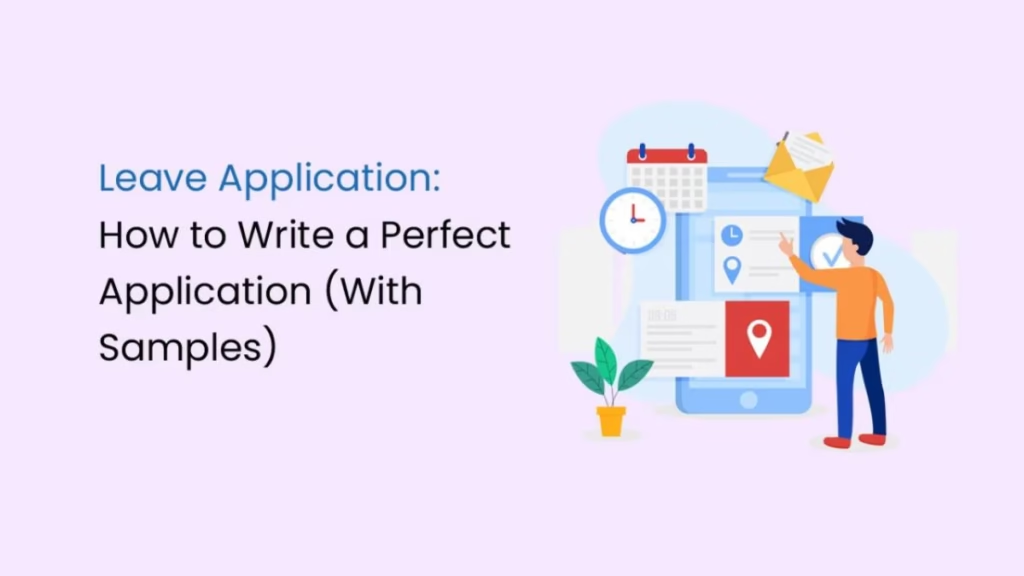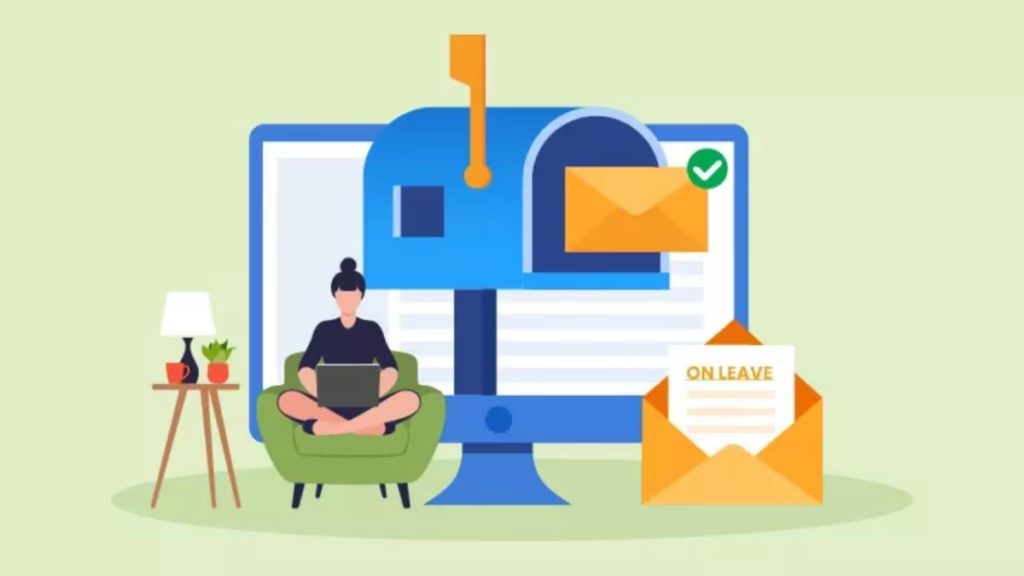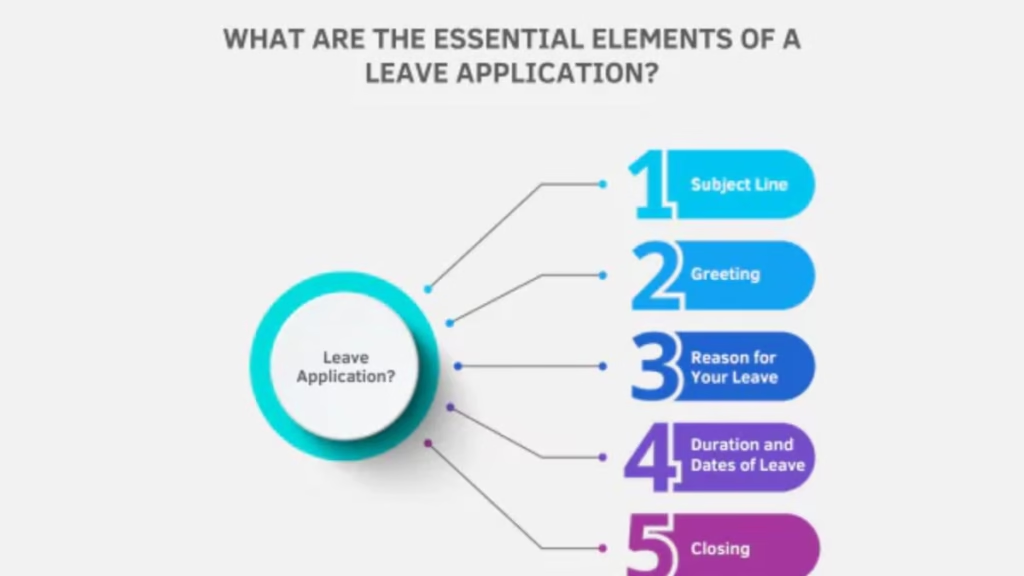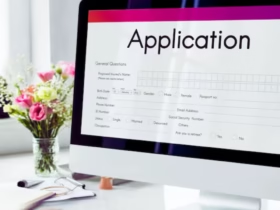Making the proper leave request is crucial in both academic and professional settings. A well-written leave request demonstrates accountability, clarity, and respect. Having the appropriate language and tone can help your request get approved, regardless of whether it’s a personal matter, a medical issue, or an emergency.
Using straightforward but businesslike language, we will describe in this article how to create successful leave applications for various situations.
Common Leave Application Types and Purposes

These categories help employers, schools, and institutions manage and approve leaves appropriately.
| Type of Leave | Purpose |
| Personal Leave | For attending family functions, travel, or important personal matters |
| Sick Leave | Health-related reasons like illness, surgery, or medical recovery |
| Emergency Leave | Unexpected events such as accidents, urgent family issues, etc. |
| Casual Leave | Short-term leave for personal errands, one-day commitments |
| Maternity/Paternity | For childbirth and postnatal care or support |
How to Write a Leave Application in 2025
There are various steps involved in writing a strong leave application. Start by explaining your goal and addressing the recipient explicitly. Give thanks and include the cause, duration, and contact details.
Don’t overexplain, be specific, and speak simply. Credibility is increased by using a polite tone, particularly in emergency situations. To ensure that the proper submission method email, printed letter, or form is followed, always refer to the organization’s policies.
Sample Leave Application Formats for Different Reasons

Here are practical formats you can use and modify as needed:
Personal Leave (For Travel or Family Reasons)
Subject: Request for Personal Leave
Respected [Sir/Madam],
I am writing to request personal leave from [start date] to [end date] as I need to attend a family commitment. I will ensure all my responsibilities are managed before my absence.
Sincerely,
Sick Leave
Subject: Sick Leave Application
Dear [Sir/Madam],
I am currently unwell and have been advised by my doctor to rest. I request sick leave from [start date] to [end date]. My medical certificate is attached.
Regards,
Emergency Leave
Subject: Emergency Leave Request
Respected [Sir/Madam],
Due to a sudden family emergency, I will be unable to attend work or school from [start date]. I kindly request leave for [number of days].
Thank you for your understanding.
Best regards,
Key Components to Include in Your Leave Application

| Component | Description |
| Subject Line | Clearly states the type of leave |
| Salutation | Polite greeting to the authority |
| Reason for Leave | Short and specific reason |
| Leave Duration | Exact dates or number of days |
| Contact Information | Optional but useful in case of updates |
| Gratitude & Closure | Thanks, anda polite closing statement |
When and How to Submit Your Leave Request

Time is of the essence. Unless there is an emergency, try to apply ahead of time. Use your favorite method of contact, such as hard copy, HR portal, or email. While employees often use professional emails, children can submit personal notes to institutions.
If jobs or obligations are assigned, mention it. It gives credibility and professionalism. For documentation purposes, always maintain a copy of your leave request.
Tips for Writing Better Leave Applications
- Use simple, clear sentences
- Avoid long paragraphs
- Be honest but professional
- Don’t exaggerate the reasons
- Keep it short and to the point
- Always mention your availability during leave if possible
- Attach relevant documents (e.g., medical certificates)
Leave Application Scenarios: What to Write and What to Avoid
Scenario: Sudden Family Emergency
Write: “Due to a family emergency, I need urgent leave starting today.”
Avoid: “Something came up and I won’t be able to make it.”
Scenario: Extended Sick Leave
Write: “As per medical advice, I require rest for five days starting May 2.”
Avoid: “I feel a bit tired, so I’ll skip work for the week.”
Real-Life Situations That Require Leave

Unpredictability is a part of life. Time away may be required due to a friend’s wedding, a grandparent’s illness, or even personal burnout. Some workers are reluctant to request leave because they worry about being judged negatively. But family time and mental health are equally as vital as work obligations.
In these situations, it helps to make a good impression to submit your leave application with honesty and sensitivity. Clear communication and well-considered demands are frequently valued by supervisors. Your strength may lie in your genuineness.
Leave Application vs Leave Letter: Are They the Same?
Although the phrases are frequently used interchangeably, a leave letter is typically a more formal request that is frequently written by hand. On the other hand, a leave application is a formal email or document. The same format and polite tone must be used in both.
Many businesses and educational institutions now favor digital media. However, in a more conventional setting, a well-written letter still has significance. Make sure your handwriting is legible and maintain a steady tone.
Digital Tools for Leave Management in 2025

Managing leave is simpler than ever in 2025. These days, a lot of businesses use HR solutions like BambooHR, Keka, or Zoho People. Employees can use these technologies to digitally seek, monitor, and receive permission. Online leave applications and parent portals have also been implemented by schools.
If you’re using a platform or app, add supporting documentation and follow the right steps. Automated notifications and follow-up messages cut down on confusion and delays.
Cross-Cultural Etiquette for Leave Applications
Being straightforward is valued in some cultures. In others, it’s important to use a gentle and considerate tone. Take cultural conventions into consideration if you’re working or studying abroad.
For instance, in Western nations, requests for brief and straightforward leaves of absence are typical. In Middle Eastern or South Asian settings, polite greetings and appreciation could be expected. Gaining an understanding of this equilibrium can help your application succeed.
Wrapping Up
Maintaining your academic or professional integrity and increasing your chances of approval are two benefits of submitting a polite and straightforward leave application. Using the appropriate format and a considerate statement when requesting personal, sick, or emergency leave demonstrates accountability. Your request is more likely to be approved if it is brief, well-organized, and sincere.
FAQs About leave Application
How should I write a leave application for personal reasons?
Start with a kind greeting and then express the reason in detail, such as travel or a family obligation. Finish the application with a polite thank-you note and include the precise dates of the leave. Don’t divulge too much personal information, but make sure the request is polite and understandable. If necessary, include supporting documentation. Make use of succinct, professional language that convey your point. Before sending, proofread.
What is the correct format for writing a sick leave application?
A medical certificate, the ailment, and the dates of rest should all be included in a sick leave application. Maintain a sincere and courteous tone. Remember to state that you will notify others or provide an update on your condition if it gets better or worse. Thank you and close the letter. The message ought to be succinct and professional. Send it in as soon as you can.
Is it okay to request emergency leave without prior notice?
Yes, you can take emergency leave without giving notice, but you must notify your superior right away. Use a phone call, email, or any other quick contact tool to explain the problem. Tell the truth about the emergency’s nature. Adding the anticipated time of your return is also beneficial. Be courteous and brief in your message. Apologies for the short notice are always welcome.
Can students apply for leave through email?
Teachers or school administrators might receive leave requests via email from students. With a subject, salutation, justification, and leave dates, the structure should be straightforward and courteous. If necessary, mention your class or roll number. Avoid using emoticons or colloquial language. Verify that the email address is accurate. Any supporting documents, such as invites to events or medical notes, should be attached.
How long can someone stay on sick leave with medical proof?
This is determined by school or corporate policy. While some would need continuous documentation, others might let you go up to a week without any queries. Always ask the administration or HR. Maintain the most recent version of your medical certificate. Tell the person in question ahead of time if you require an extension. Be professional in all of your correspondence. Try to return to work as soon as you’re well.
What are the best tips to avoid rejection of leave applications?
Make sure your leave request is precise and succinct, and submit it ahead of time. Give a good rationale, include the right dates, and explain how your work will be done while you’re away. Steer clear of ambiguous or overblown assertions. Attach the required files. Talk to the right person. Make use of formal language. If you don’t hear back, follow up.
Is there a difference between personal and emergency leave?
Indeed, personal leave is frequently scheduled for occasions like weddings and trips, but emergency leave is reserved for unforeseen circumstances like accidents or medical emergencies. Typically, personal leave is requested in advance. Emergency leave necessitates immediate contact. Both ought to be written respectfully and clearly. Different organizations handle these cases in different ways. The sort of leave should always be mentioned.







